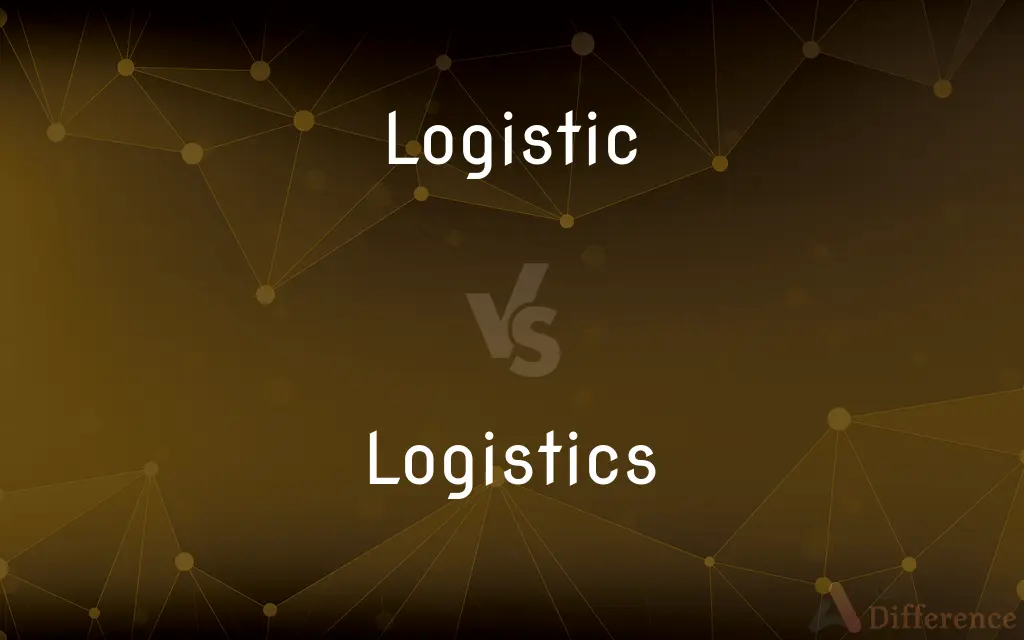Logistic vs. Logistics — What's the Difference?
Edited by Tayyaba Rehman — By Maham Liaqat — Updated on April 16, 2024
Logistic refers to the detailed organization and implementation of a complex operation, whereas logistics deals with the overall process of managing how resources are acquired, stored, and transported.

Difference Between Logistic and Logistics
Table of Contents
ADVERTISEMENT
Key Differences
Logistic focuses on the theoretical foundation and mathematical calculations used to optimize operations, whereas logistics encompasses the practical application of these theories in real-world scenarios.
In business, logistic may refer to specific tasks within a larger framework, like logistic regression in statistics, while logistics refers to the entire supply chain management process.
Logistic is often used in a more academic or technical context, highlighting specific operations or problems, whereas logistics is a broader term used in commerce and industry.
Military operations often discuss logistic concerns relating to specific tactical maneuvers, whereas logistics in this field would cover a broader scope, including supply chain, transportation, and procurement.
The singular form 'logistic' emphasizes individual components or aspects of systems management, whereas the plural form 'logistics' implies a more integrated, holistic view of these systems.
ADVERTISEMENT
Comparison Chart
Definition
Related to detailed organization and implementation of specific operations
Broad management of procurement, maintenance, and transportation of resources
Usage Context
Academic, technical, specific operational tasks
Business, industry, wide-ranging operations
Common Fields of Application
Statistics (e.g., logistic regression), military specific operations
Supply chain management, military overall planning, commerce
Scope
Narrow, focusing on particulars
Broad, encompassing entire processes
Form
Typically used in singular
Typically used in plural
Compare with Definitions
Logistic
In mathematics, dealing with logistic growth.
The population model follows a logistic curve.
Logistics
Planning and executing complex operations.
He specializes in event logistics for large venues.
Logistic
Pertaining to logistics.
The logistic challenges of the mission were complex.
Logistics
The organizational aspect of any business or service operation.
Effective logistics are key to successful business management.
Logistic
Concerning specific operational tasks.
His job involved several logistic responsibilities.
Logistics
The management of the flow of things between the point of origin and the point of consumption.
She works in logistics, ensuring timely delivery.
Logistic
In statistics, logistic regression is used to describe data.
We used logistic regression to predict outcomes.
Logistics
The detailed coordination of complex operations involving many people, facilities, or supplies.
Logistics of the festival were handled by a professional team.
Logistic
Related to the detailed organization of a plan.
The project required precise logistic calculations.
Logistics
Military operations dealing with procurement, supply, and transport.
Military logistics are crucial for operational success.
Logistic
Of or relating to logistics.
Logistics
Logistics is generally the detailed organization and implementation of a complex operation. In a general business sense, logistics is the management of the flow of things between the point of origin and the point of consumption to meet the requirements of customers or corporations.
Logistic
Of or relating to symbolic logic.
Logistics
The aspect of military operations that deals with the procurement, distribution, maintenance, and replacement of materiel and personnel.
Logistic
(mathematics) Relating to symbolic logic.
Logistics
The management of the details of an operation.
Logistic
(statistics) Relating to the logistic function.
Logistics
(operations) The process of planning, implementing, and controlling the efficient, effective flow and storage of goods, services and related information from their point of origin to point of consumption for the purpose of satisfying customer requirements.
Logistic
Using sexagesimal fractions, especially in arithmetic or logarithms.
Logistics
(military) The procurement, supply, maintenance, and transportation of equipment, facilities, and personnel.
Logistic
Relating to basic arithmetic.
Logistics
That branch of the military art which embraces the details of moving and supplying armies. The meaning of the word is by some writers extended to include strategy.
Logistic
Skilled in calculating.
Logistics
The planning and coordination of the movement of materials, and other details of any large activity, such as a business or a political campaign.
Logistic
Proportional.
Logistics
A system of arithmetic, in which numbers are expressed in a scale of 60; logistic arithmetic.
Logistic
(operations) Relating to logistics.
Logistics
Handling an operation that involves providing labor and materials be supplied as needed
Logistic
A logistic function or graph of a logistic curve.
Logistic
The art of calculation.
Logistic
Sexagesimal arithmetic.
Logistic
Logical.
Logistic
Sexagesimal, or made on the scale of 60; as, logistic, or sexagesimal, arithmetic.
Logistic
Of or pertaining to logistics; as, logistic requirements; logistical problems; a logistical nightmare.
Logistic
Of or relating to logistics;
Logistic requirements
Common Curiosities
What are common tools used in logistics?
Common tools in logistics include supply chain management software, transportation management systems, and warehouse management systems.
How does military logistics differ from commercial logistics?
Military logistics deals with the specifics of military operations, such as troop movement and equipment provisioning, whereas commercial logistics focuses on business operations and consumer goods.
What skills are essential for a career in logistics?
Essential skills for a career in logistics include strategic planning, system analysis, problem-solving, and communication.
What is logistic primarily used for?
Logistic is primarily used in specific, detailed planning and problem-solving within a larger operation.
Is logistic regression related to logistics?
Logistic regression is a statistical method used to model data and predict outcomes; it is related to logistic in its mathematical approach, not logistics.
Can logistic be used interchangeably with logistics?
No, logistic and logistics are not interchangeable as logistic refers to specific tasks or models, while logistics refers to broader systems management.
How does logistics apply to business?
In business, logistics involves managing the entire lifecycle of product movement, from acquiring raw materials to delivering finished products to consumers.
How do logistics companies handle international shipping?
Logistics companies handle international shipping by coordinating with various carriers, managing legal and customs requirements, and optimizing routes for speed and cost.
What is the impact of technology on logistics?
Technology has a significant impact on logistics, improving efficiency and accuracy in inventory management, delivery tracking, and operation optimization.
What is the role of logistics in e-commerce?
In e-commerce, logistics plays a critical role in inventory management, order fulfillment, and ensuring timely deliveries to customers.
Share Your Discovery

Previous Comparison
Sleek vs. Smooth
Next Comparison
Acquit vs. ExonerateAuthor Spotlight
Written by
Maham LiaqatEdited by
Tayyaba RehmanTayyaba Rehman is a distinguished writer, currently serving as a primary contributor to askdifference.com. As a researcher in semantics and etymology, Tayyaba's passion for the complexity of languages and their distinctions has found a perfect home on the platform. Tayyaba delves into the intricacies of language, distinguishing between commonly confused words and phrases, thereby providing clarity for readers worldwide.
















































